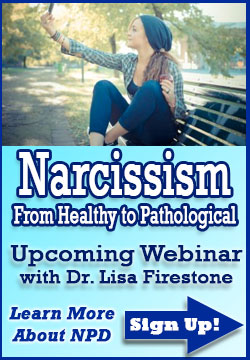Narcissist Never Want to See Him Again
In a Relationship with a Narcissist? What Yous Need to Know About Egotistic Relationships
 Egotistic relationships are formed when one or both partners struggle with a narcissistic personality. Narcissistic Personality Disorder (NPD) is divers by The Mayo Clinic every bit "a mental disorder in which people have an inflated sense of their own importance and a deep demand for admiration. Those with egotistic personality disorder believe that they're superior to others and take little regard for other people's feelings. Simply backside this mask of ultra-confidence lies a fragile self-esteem, vulnerable to the slightest criticism."
Egotistic relationships are formed when one or both partners struggle with a narcissistic personality. Narcissistic Personality Disorder (NPD) is divers by The Mayo Clinic every bit "a mental disorder in which people have an inflated sense of their own importance and a deep demand for admiration. Those with egotistic personality disorder believe that they're superior to others and take little regard for other people's feelings. Simply backside this mask of ultra-confidence lies a fragile self-esteem, vulnerable to the slightest criticism."
We live in an increasingly egotistic earth. Hard statistics and science are pointing in this management. The "await at me" mentality that is often promoted by social networks similar Facebook has people positively enamored with the epitome they present to the world. In improver, nosotros may now exist seeing the negative furnishings of the self-esteem movement on a larger scale. And so how does this ascension in narcissism impact our personal relationships? For one thing, more narcissism means more egotistic relationships.
Professor Brad Bushman of the Ohio Country Academy put it bluntly, when he said: "Narcissists are very bad relationship partners." Studies show that in a egotistic relationship, your partner is more likely to engage in manipulative or game playing behaviors and less likely to be committed long-term. A relationship with a narcissist tin can exist hard to cope with. To shed light on the common outcomes, struggles, and effects of a narcissistic relationship, we've interviewed psychologist and author Dr. Lisa Firestone.
How Can You Tell if You Are in a Narcissistic Human relationship?
When thinking about narcissism, I'm ofttimes reminded of the joke when someone goes on and on almost themselves, then interrupts with, "But plenty about me, how do you feel about me?" If your partner is all near themselves, always needing attention and affirmation, he or she may be a narcissist. If someone is easily slighted or over-reactive to criticism, they may too be a narcissist. If they feel they are always correct, that they know more than, or that they have to be the best, etc., these are too signs of narcissism. Narcissistic individuals may only appear to care about you when you are fulfilling their needs or serving a purpose for them. A narcissistic human relationship tin can lead to a lot of emotional distress.
It is estimated that around 1% of population suffers from NPD. However, many people who take NPD practice not seek treatment and therefore are never diagnosed. Studies testify that men are more likely to be narcissistic. Roughly 75% of the individuals diagnosed with NPD are men. Although almost everyone has some cocky-centered or egotistic traits, well-nigh people do non encounter the criteria for having a personality disorder. In that location is, however, a growing portion of the population that is displaying a greater number of toxic, narcissistic traits, which are having an adverse outcome on their lives and the lives of people shut to them, fifty-fifty if they do not encounter the clinical diagnosis of NPD. Forming attachments to individuals who exhibit these negative traits often causes similar distress as a diagnosable narcissistic human relationship.
A new study from Ohio State Academy has establish that 1 simple question can identify narcissists every bit accurately as the twoscore-item test that has been widely used to diagnose NPD. The question is simple, rating yourself on a scale of one-7: "To what extent do you agree with this statement: I am a narcissist. (Notation: The give-and-take 'narcissist' means egotistical, self-focused and vain.)" You tin even attempt out this costless interactive narcissism quiz. Yet, while this study suggests that many narcissists will freely admit to their narcissistic tendencies, it is important to annotation that most narcissists resist the diagnosis of NPD. Narcissists, generally, exercise not like to be told that they are narcissists. In fact, they often take a strong negative and volatile reaction.
Below are some common traits that a narcissistic human relationship partner is likely to have: (Notation the degree to which these traits manifest themselves will vary largely depending on the individual.)
- Sense of entitlement or superiority
- Lack of empathy
- Manipulative or controlling behavior
- Strong need for admiration
- Focus on getting one's ain needs met, frequently ignoring the needs of others
- Higher levels of assailment
- Difficulty taking feedback about their behavior
 Why do people get narcissistic? Is it a symptom of something else?
Why do people get narcissistic? Is it a symptom of something else?
Narcissistic people oftentimes accept narcissistic parents, who offered them a build upwardly only no real substance. Their parents wanted them to be great, then they could be the parent of a great person, the best artist, smartest student, etc. Often narcissistic people were also neglected, as their parents were so focused on themselves that they could not attune to their child or meet their child's emotional needs. The kid was but useful to these parents when they were serving a purpose for them. Often, the parents of a person with NPD alternated betwixt emotional hunger toward the child and disinterest.
Narcissists accept inflated cocky-esteem (both cocky-soothing and self-aggrandizing "voices") a component of what my father, Dr. Robert Firestone, refers to as the "anti-cocky." They are very fragile, because the flip side of their cocky-aggrandized feeling is very low self-esteem, the other component of the anti-self (fabricated upwards of extremely self-hating and self-demeaning "critical inner voices"). Then, for these people, even slight criticism can exist a narcissistic injury, leading to an angry outburst and drastic attempts to regain their fragile, inflated cocky-esteem. Often, a condescending remark will aid them to reestablish their superior image. Condescending is a common dynamic in narcissistic relationships. This behavior can exist traced dorsum to the need drastic demand narcissists feel to be higher up others.
What are the unlike types of Narcissism?
While all narcissists are likely to show certain behaviors, non all narcissists are the same. In fact, there are two different types of narcissism, Grandiose Narcissism and Vulnerable Narcissism. These types of narcissism stalk from unlike early childhood experiences andlead to different behaviors in a relationship.
Grandiose narcissists brandish high levels of grandiosity, aggression and say-so. They tend to be more confident and less sensitive. They are oftentimes elitists and have no trouble telling everyone how great they are. Usually grandiose narcissists were treated as if they were superior in their early childhood and they movement through life expecting this type of treatment to keep. In relationships, grandiose narcissists are more probable to openly appoint in infidelity or leave their partners abruptly if they feel that they are not getting the special treatment that they think they are entitled to.
Vulnerable narcissists, on the other hand, are much more emotionally sensitive. They have what Dr. Campbell describes as a "fragile grandiosity," in which their narcissism serves as a façade protecting deeper feelings of inadequacy and incompetence. Vulnerable narcissists swing back and forth between feeling superior and junior. They frequently feel victimized or anxious when they are not treated as if they are special. This type of narcissism usually develops in early childhood as a coping mechanism to bargain with abuse or neglect. In relationships, vulnerable narcissists often worry about how their partners perceive them. They can be very possessive, jealous and paranoid most their partners having flirtations or affairs.
 How does a narcissistic partner negatively impact a human relationship?
How does a narcissistic partner negatively impact a human relationship?
Narcissistic relationships tend to be very challenging. Egotistic partners usually take difficulty really loving someone else, because they don't truly dearest themselves. They are and then focused on themselves that they cannot really "encounter" their partner as a carve up person. They tend to only run across the partner in terms of how they fill their needs (or fail to fill their needs). Their mates and children are only valued in terms of their power to meet these needs. Egotistic partners often lack the ability to have empathy with their partners' feelings. This lack of empathy leads to a lot of hard feelings.
Notwithstanding many people are drawn to narcissistic relationships. Narcissistic partners can be very captivating, especially at the beginning. They tend to have a "big" personality. They are the life of the party. They tin make you feel that you too must be great for them to choose y'all. All the same, in time, they can exist likewise controlling in relationships. They may feel jealous or easily injure. When egotistic injuries occur, they oftentimes lash out and tin exist cutting. Their reactions are dramatic and attending-seeking. According to narcissistic personality expert, Dr. West. Keith Campbell, "The effects of narcissism are most substantial in relation to interpersonal functioning. In general, trait narcissism is associated with behaving in such a style that 1 is perceived as more likable in initial encounters with strangers— but this likability diminishes with time and increased exposure to the narcissistic private." This is why many people, who have been in a long-term egotistic relationships, describe a very passionate and heady honeymoon period in the starting time and then a precipitous decline as the likability decreases and the self-centered behaviors increment. Narcissists are prone to falling madly in love with someone instantly and are very quick to commit. However, this initial love and commitment is non hands sustained.
When y'all are in a narcissistic relationship, y'all may feel very lonely. Yous might feel like you are just an accessory and your needs and wants are unimportant. Narcissistic partners act as if they are always right, that they know better and that their partner is wrong or incompetent. This oft leaves the other person in the relationship either aroused and trying to defend themselves or identifying with this negative cocky-image and feeling badly about themselves.
Read: Is There a Cure For Narcissism
What are some things a person can do to deal with a narcissistic partner?
If you find yourself in a narcissism relationship, you can beginning recognize what y'all have called and reflect on the unconscious motives that might take led you to choose such a partner. Did you take a self-centered parent? Are you lot more than comfy with your partner existence in control, so you can then have be more passive? Exercise you become a sense of worth from being attached to someone who is in the spotlight? Does the negative image of yourself they foster with their criticisms and superior attitudes resonate with your own disquisitional thoughts most yourself? Many people who fall in love with narcissists take bug around co-dependency. They will put upward with a certain amount of corruption because they don't feel confident enough in themselves to set boundaries or exist on their ain.
Agreement your part in the narcissistic relationship is important. You tin and so offset to challenge yourself to change your half of the dynamic. This volition, in plough, challenge your partner to change their style of relating. You can recognize the fragility of your partner's self-esteem and accept compassion for the fact that his or her inflated sense of self, superiority and grandiosity is a embrace upward for the flip side of cocky-hate and feelings of inadequacy. You tin too develop your ain self-confidence and self-worth by learning to practice self-compassion. Don't be a victim. In all encounters, act equal, and treat your partner every bit an equal.
 How tin people face and overcome their own narcissism?
How tin people face and overcome their own narcissism?
A narcissist can challenge and overcome their narcissism by recognizing and separating from both the cocky-soothing, self-aggrandizing and cocky-attacking attitudes of their critical inner vocalism. The attitudes they internalized very early on in their lives. They need to recognize and challenge these attitudes toward themselves and toward others. One method for doing this is through Vocalisation Therapy.
Narcissists further need to differentiate from negative traits of their parents or early caretakers that they are nonetheless acting out in their current lives. These traits might include superior attitudes or condescending behaviors. They likewise need to surrender the adaptations they made to the ways their own parents neglected them or were emotionally hungry toward them. These adaptations may have once been their survival mechanisms, but they at present manage to push others abroad and sabotage personal lives and goals. Narcissists also need to break patterns of being cocky-centered or withholding. They must fight the tendency to always compare themselves to others and the need to be the "best" or "perfect" all the time.
Some other way to cure narcissism is to foster self-compassion rather than self-esteem. Psychologist Dr. Kristin Neff has done all-encompassing research on self-esteem versus cocky-compassion. The difference between self-esteem and self-pity is that self-esteem centers on evaluating yourself in relation to others and emphasizes a demand to be special. While cocky-compassion focuses on "treating oneself with kindness, recognizing one's shared humanity, and existence mindful when considering negative aspects of oneself." Dr. Neff's studies have establish that self-esteem leads to college levels of narcissism, only self-compassion does non. Self-compassion actually combats narcissism considering it includes the idea of a shared humanity with all other human beings, which leads to more pity for others. Self-compassion also fosters real self-awareness, a trait many narcissists lack, every bit it promotes that nosotros be mindful of our faults, which is the first step to changing negative traits in yourself.
For in that location to exist any hope of recovering a adept human relationship from a narcissistic relationship, the narcissist must overcome their self-centered and negative traits. They need to challenge their self-feeding habits and pseudo-independent stance. They need to focus on developing their chapters for empathy and respect of others. Lastly, they demand to develop transcendent goals, to intendance about and invest in others' well-being. Beingness generous and giving to others are examples of behaviors that would be corrective, building existent cocky-esteem and practicing focusing outside of oneself.
Tags: destructive relationship, narcissism, narcissistic, narcissistic relationship, relationship communication
Source: https://www.psychalive.org/narcissistic-relationships/


0 Response to "Narcissist Never Want to See Him Again"
Post a Comment